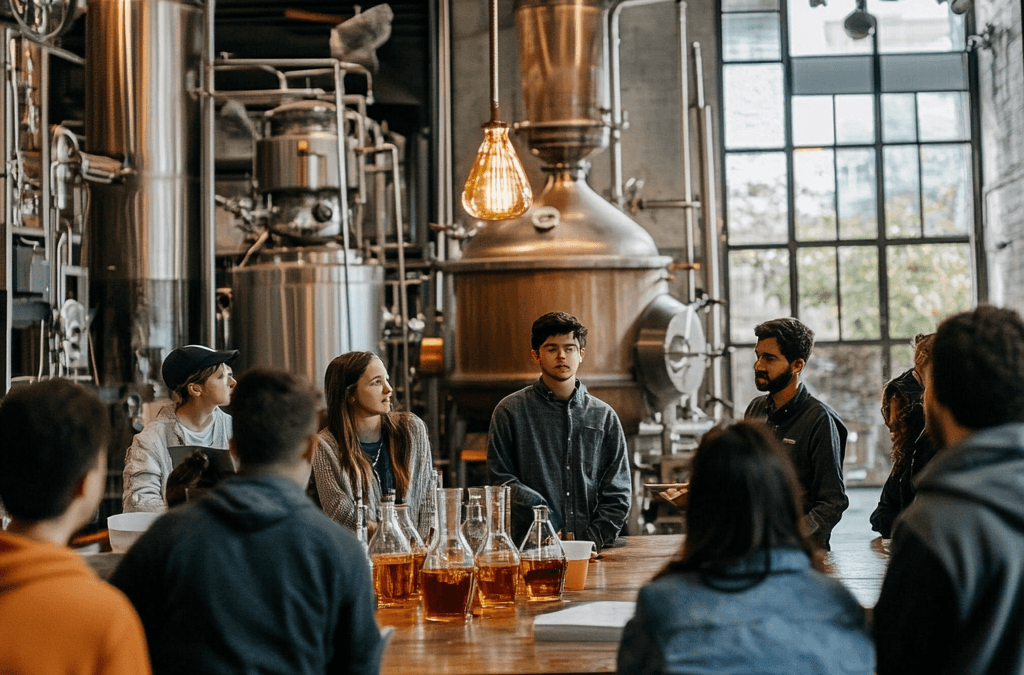Choosing the right distilling classes is an important step for anyone looking to start a career in craft spirits or improve their distillation skills. With numerous options available, from online courses to hands-on workshops, selecting the best program can be overwhelming. This guide will help beginners determine the key factors to consider when choosing distilling classes that align with their goals.
Why Distilling Classes Matter
Distilling is both an art and a science, requiring a deep understanding of fermentation, equipment operation, and aging techniques. Enrolling in the right distilling classes provides:
- Hands-on experience with industry-standard equipment
- Expert guidance from experienced distillers
- A structured learning path covering essential techniques
- Networking opportunities with fellow enthusiasts and professionals
Step 1: Define Your Goals in Choosing the Right Distilling Courses
Before selecting a distilling class, consider your objectives. Are you:
- A home enthusiast looking to refine your hobby?
- An aspiring distillery owner seeking professional training?
- A career changer wanting to enter the craft spirits industry?
- A distillery employee aiming to expand your technical knowledge?
Understanding your goals will help you choose between introductory courses, advanced training, or specialized workshops.
Step 2: Decide Between Online or In-Person Classes
Both online and in-person distilling classes have advantages depending on your learning style and availability.
Online Distilling Classes
- Convenient and self-paced learning
- Ideal for foundational knowledge in fermentation, distillation, and regulations
- Suitable for individuals who cannot travel to workshops
In-Person Distilling Workshops
- Hands-on experience with real distillation equipment
- Direct access to instructors for live feedback
- Practical training in fermentation, mashing, proofing, and aging
- Networking opportunities with industry professionals
Step 3: Research Course Content
Not all distilling classes cover the same material. When evaluating a course, look for:
- Comprehensive Curriculum – Covers raw materials, yeast selection, fermentation, distillation, aging, and proofing.
- Legal and Safety Training – Includes regulations, compliance, and safe alcohol handling.
- Equipment Training – Teaches how to operate pot stills, column stills, and fermentation vessels.
- Quality Control Methods – Explains how to test for proof, clarity, and flavor consistency.
Step 4: Verify Instructor Expertise
A quality distilling class should be taught by industry experts with practical experience. Look for instructors who:
- Have worked in or owned a distillery
- Understand both traditional and modern distillation methods
- Can provide real-world insights and troubleshooting advice
- Have a proven track record of teaching distilling classes
Step 5: Check Reviews and Testimonials to Help Choose the Right Distilling Classes
Before committing to a course, read reviews from past students. Pay attention to feedback regarding:
- Course structure and clarity
- Hands-on learning opportunities
- Instructor engagement and expertise
- Overall value for money
Step 6: Consider Certification Opportunities
Some distilling classes offer certification upon completion, which can be beneficial for career advancement. Certifications demonstrate:
- Formal training in distillation techniques
- Knowledge of industry standards and best practices
- A commitment to professional development
Conclusion
Choosing the right distilling classes requires careful research and consideration of your goals, learning preferences, and instructor expertise. Whether opting for an online course or an in-person workshop, selecting a well-structured program will provide the knowledge and hands-on experience needed to excel in distilling. Take the time to explore your options and invest in quality education to build a strong foundation in the craft spirits industry. To learn more about your workshop options, take a look at this article. For a different approach to learning the trade, here’s a forum on HomeDIstiller.org.

